#dinadan
Text

he takes requests
[link to GRADALIS]
#gradalis#gradalis palamedes#gradalis dinadan#arthuriana#palomides#dinadan#i did it again i accidentally deleted the post istg#kochei doodles
153 notes
·
View notes
Text


#the worst lay that ever harper sang with harp or with any other instruments oh malory read him to FILTH#poor guy#le morte d'arthur#thomas malory#arthuriana#arthurian literature#arthurian legend#sir dinadan#dinadan#would you believe that i created this from a mikey way rolls worst joint ever asked to leave my chemical romance meme#you can catch a sliver of a glimpse of mikey just under the left hand photo lmaoo#knights#knights of the round table#medieval literature
44 notes
·
View notes
Text

april fools has ended but the jokes haven’t!
#mordred no!#arthuriana#dinadan#sir dinadan#mordred#sir mordred#arthurian literature#arthurian meme#arthurian legend#arthurian shitpost#knights am i right#comic
27 notes
·
View notes
Text
Dinadan was so angry that Lancelot was so angry at King Mark so he composed a song about how shitty King Mark was. Dinadan then taught it to a harper who taught the song to everyone else.
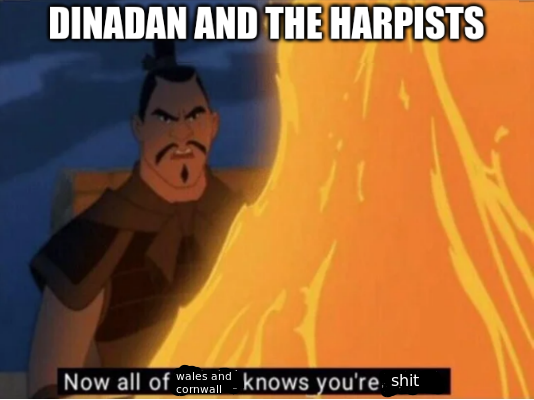
#arthuriana#le morte d'arthur#sir dinadan#dinadan#lancelot du lac#king mark#through the power of song#heli blobbing#damn it was dinadan
47 notes
·
View notes
Text
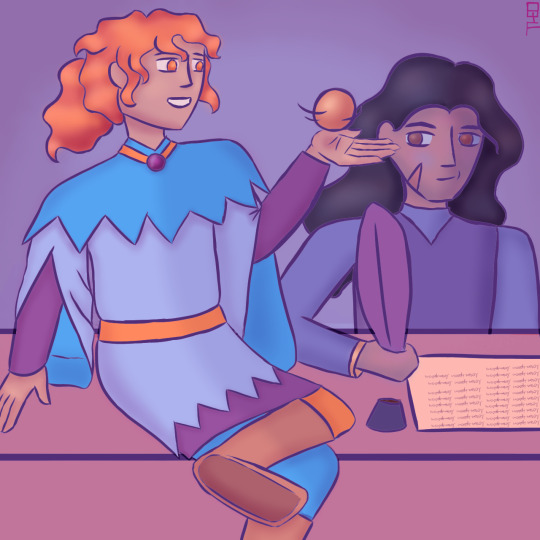
"And then I looked over at Mark and you would not believe how red he was..."
For @mortiscausa 's march to Camelot prompt "fool"
I just think Dinadan and Kay should be pals they gossip together and bemoan their idiot friends' love lives
28 notes
·
View notes
Conversation
Dinadan: It's valentine's day, so I sent a box of chocolates to the hottest guy at the round table.
Palomides: The note you left on it just said 'to the hottest guy at the round table.'
Dinadan: I know. I didn't have anyone specific in mind, but now they're all fighting over who's the hottest and I get to watch.
27 notes
·
View notes
Text
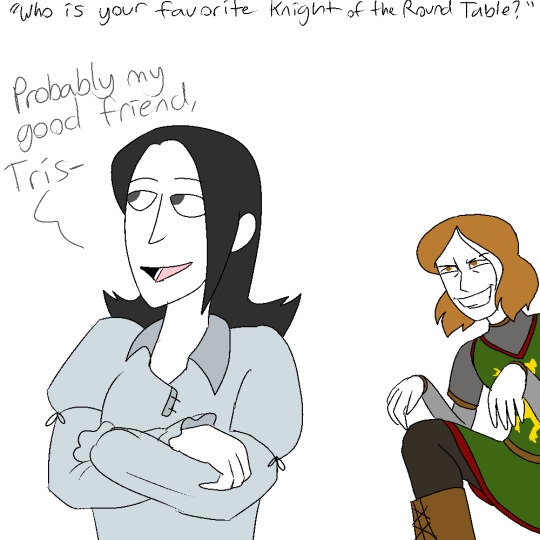
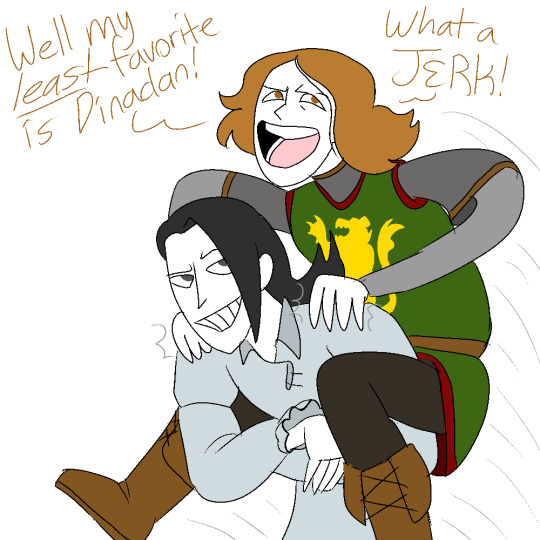
This was all an elaborate plot to finally introduce Tristan.
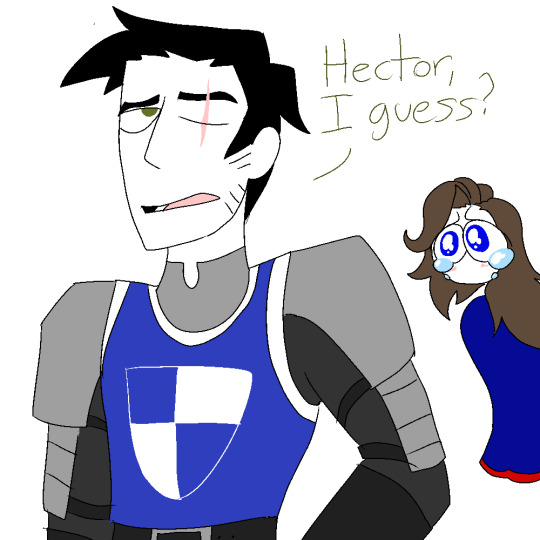
Bonus Hector de Maris appreciation
#knightsofsomethingorother#KOSOO#arthurian shitposting#arthurian meme#comic#dinadan#tristan#hector#agravaine
21 notes
·
View notes
Text
When you realize that Tristan, Iseult, Dinadan, Palamedes, and Mark are basically the stock cast of a sitcom…
#tristania#arthuriana#sitcoms#tristan#he’s the melodramatic main character#iseult#she’s the love interest#dinadan#he’s the snarky best friend#palamedes#he’s the melodramatic rival/frenemy#King Mark#he’s the jerk#or the guy who everyone hates for no reason#depending on your perspective#Would Iseult Blancmains be a character? I don’t know#I feel like this could be a thing if it weren’t already a thing
24 notes
·
View notes
Note
oh oh… dinadan or la cote mal fet for the vulgate:)))
I’ve been attacked with brain worms
Bad news my friend, neither of these characters appear in the Vulgate! Might I interest you in some La Tavola Ritonda instead?

Name key:
Amorotto = Lamorak
Brunoro = Brunor
Daniello = Daniel
Dinadano = Dinadan
Lancilotto = Lancelot
Tristano = Tristan
Send me a character and I’ll reply with a Vulgate passage!
#arthurian legend#arthurian legends#arthuriana#arthurian mythology#arthurian literature#dinadan#sir dinadan#brunor#sir brunor#la cote male taile#knight of the ill-cut coat#la tavola ritonda#quotes#ask#i-dont-know134
12 notes
·
View notes
Note
Just started reading/playing The Bastard of Camelot and I'm utterly smitten! Hook line and sinker I'm in on this. I think I'm at around chapter 3 or 4 (can't quite remember), its been absolutely addicting. Gawain is such a cinnamon roll, it's adorable! I also love how many ways you can choose to handle a situation, from vindictive and spiteful to calm and mature.
I have a couple of questions to ask, which you may or may not have been asked before (and if so I apologize in advance!)
1. How are you able to think up/write so many branching paths and outcomes with the same level of quality and attention to detail?
2. What does your brainstorming process look like? Do you do meticulous planning with enough graphs, flow charts and corkboards to make you seem like a mad genius, or do they simply appear to you like a revelation that came to an Ancient Greek historian in a dream?
3. You may notice by my username that I'm kind of obsessed with Sir Dinadan. Does he make an appearance in the story? If so, when and also can we befriend him and prank people with him?
These are all the questions I have, feel free to answer them as you please, be it to all, or just one, or none at all. I love BOC so much!
Thank you so much! 💕
To answer your questions:
1. I'll say, writing interactive fiction is definitely more... Intensive than traditional writing. I just try my best to make all routes interesting/worthwhile. I'm also just really excited to explore all sorts of Mordreds :) And whenever there's a possible reaction for Mordred that I have overlooked, people have brought it up.
2. So brainstorming! A little bit of both lol? I don't have anything as organized as flow charts (I did too many flow charts at university sjsjdjc) but I do have notes upon notes of scenes and ideas and drafts, lists of variables with annotations, and a dedicated Boc notebook where I write the more organized ideas and book/chapter layout. I like having a general plan, and when I prepare to write a chapter I go in detail, but I'm also flexible with changes.
3. Dinadan does make an appearance! They use they/them, and you'll have the opportunity to befriend them. They're very easy-going and like to joke around, their humor leans a bit sardonic. They appear in book 1, around chapter 7.
59 notes
·
View notes
Text


Dinadan is forced to be the voice of reason and it’s very upsetting to him.
This is like my favorite Dinadan moment in Le Morte de Arthur. Dinadan cursing the day he ever met Tristan is so funny to me.
#arthurian legend#arthurian literature#arthurian mythology#king arthur#arthuriana#sir dinadan#sir tristan#sir tristam#sir lancelot#lancelot du lac#dinadan#le morte d'arthur
45 notes
·
View notes
Text
The presence of feminine traits in Dinadan’s own character might give the reader another reason not to take Dinadan’s criticism of love-smitten knights as an argument against the place of women in the world of chivalry. While Dinadan does moderately well in tournaments, he is often gently mocked by his judges too. On one occasion he jousts with Lancelot, who is dressed as a woman, and when Dinadan loses, Lancelot’s squires force Dinadan into female clothing. Later, Dinadan mocks Tristram for losing a tournament to Palomides, but ‘all this langayge Sir Dynadan sayde because he wolde angur Sir Trystram for to cause hym to wake hys speretes, for well knew Sir Dynadan that, and Sir Trystram were thorowly wrothe, Sir Palomydes shulde wynne no worship uppon the morne’ (438/10:72). His plan works as Tristram takes his words to heart, and it is Gareth who guesses Dinadan’s intent, and explains to Tristram: ‘Pardé, sir, he seyde hit for none ylle, for ye ar the man in the worlde that he lovyth beste, and all that he seyde was for youre worshyp’ (441/10:74). Gareth has had plenty of experience of ‘raylynge langage’ (438/10:72) at the hands of Lyonet, and recognises helpful chiding for the sake of ‘worshyp’ when he hears it. Dinadan is the only male character to employ the technique of the chiding damsels. Perhaps he is bemused by the madness of lovesick knights because he has no need for female companions in his life; he already possesses the traits characteristic of female judges of knightly deeds. Coleman suggests that Dinadan’s language is damaging, that ‘used in a good cause, it is nonetheless inherently deceptive.’ She goes on to conclude that Malory’s Dinadan ‘exposes not the superficial silliness of court ritual but the inevitably destructive consequences of human instability.’ Whilst this may be true to some degree, it is important to keep in mind the driving force behind Dinadan’s behaviour; as Cooper has observed, ‘his love for and service of Tristram is his primary motivation.’ Dinadan’s words and actions are generous, they attempt to further the reputation of a comrade, and so they denote fellowship; Dinadan’s language shares all of the attributes of Malory’s chiding damsels.
— Women of Words in Le Morte Darthur: The Autonomy of Speech in Malory’s Female Characters by Siobhán M. Wyatt
#not proud of myself for posting a quote from a book about female characters and it's a quote about a male one lol#i have some about isolde in my drafts too though#anyway. love this guy and his whole deal#arthuriana#arthurian legends#dinadan#tristan#gareth#le morte d'arthur#gella talks arthuriana#talk talk talk
17 notes
·
View notes
Photo
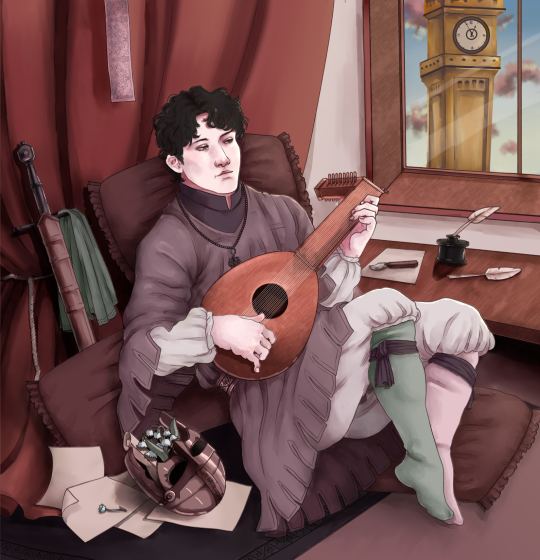
tumblr made me shrink this dinadan so bad. anyway
#arturiana#arthuriana#dinadan#arthurian legend#sir dinadan#what if you were a rock. an island maybe#and you had say for arguments sake your books and your poetry#to like protect you or something
89 notes
·
View notes
Text
Percival: Are we really going to let Lancelot keep Galehaut?
Dinadan: We kept Gawain.
#yes Percival let Lancelot keep his boyfriend#also cmon Gawain isnt THAT bad#mythology memes#incorrect quotes#incorrect mythology quotes#incorrect mythology#arthurian mythology#arthurian legend#arthurian knights#dinadan#lancelot#galehaut#percival#gawain#gwaine#lancelot x galehaut#knights of the round table
29 notes
·
View notes
Note
Fun fact please?
Underappreciated characters are a thing tonight so Today You Learned about Sir Dinadan!
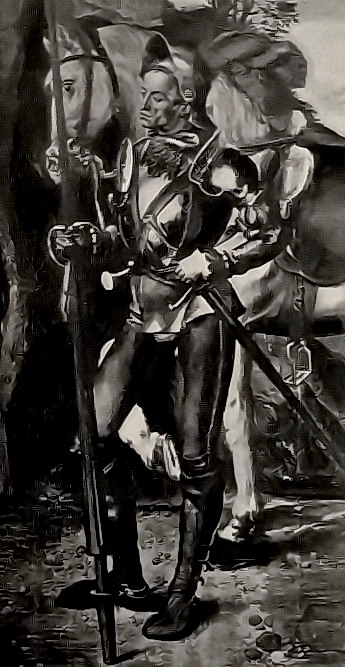
In King Arthur stories there’s a butt-ton of random characters, including over a hundred knights of the Round Table. And among them is Sir Dinadan, first attested in one of the versions of the Sir Tristan story. He’s the son of Sir Bruenor Senior, and his brothers Sir Bruenor Jr. and Daniel are also knights. What makes Sir Dinadan stand out from other knights is that A) his sense of humor and B) despite his bravery and own skill with a sword, he actually prefers to avoid both fighting and that whole courtly love nonsense.
[Courtly Love, if you don’t know, is this popular idea in medieval romances of knights falling in love with an unattainable woman. Lancelot and Guinevere is the example usually trotted out for this.]
This sounds like common sense if you ask me, but it was incredibly uncommon among Arthur’s knights! They loved to get into fights to prove their worth and fall in love with women they couldn’t easily be with. But not Dinadan: he was just not into that crap. He was more of a wise guy–he liked pulling jokes, telling jokes, and being the butt of jokes. Much better than getting whaled on by other knights. He was also incredibly clever in other ways, such as being able to tell who the other knights are in full armor even if they’re not wearing their coat of arms–again, a really useful trait, considering how often it happens in Arthurian stories.
Sadly, despite being an all-around nice guy, in Mallory’s Le Morte d’Arthur, he’s friends with Sir Lamorak, which gets him on the hit list of the Orkneys (there’s a feud between the sons of Lot of Orkney and Lamorak’s family). When he’s on the way back home, wounded from a fight, Dinadan is jumped by Agravaine and Mordred, and they murder him. He gets back home with enough time to drop dead in Lancelot’s arms.
That’s rough buddy.
Because he’s not really a key part in the more popular stories, he’s left out of most adaptations, and if he appears at all it’s basically a named extra, like this one number in Camelot. Dinadan does get a wonderful story in Gerald Morris’s Squire’s Tales series, featured as the title character in The Ballad of Sir Dinadan. That one changes his backstory into being Sir Tristan’s brother, explaining why he hangs out with him at all, and spends the entire novel lampshading how stupid Tristan and Isolde are being. It’s brilliant. He’s also brought back in the last two books of the series despite not doing much because he was such a fun and popular character in the series.
So Dinadan! Show him some appreciation.
19 notes
·
View notes
Text
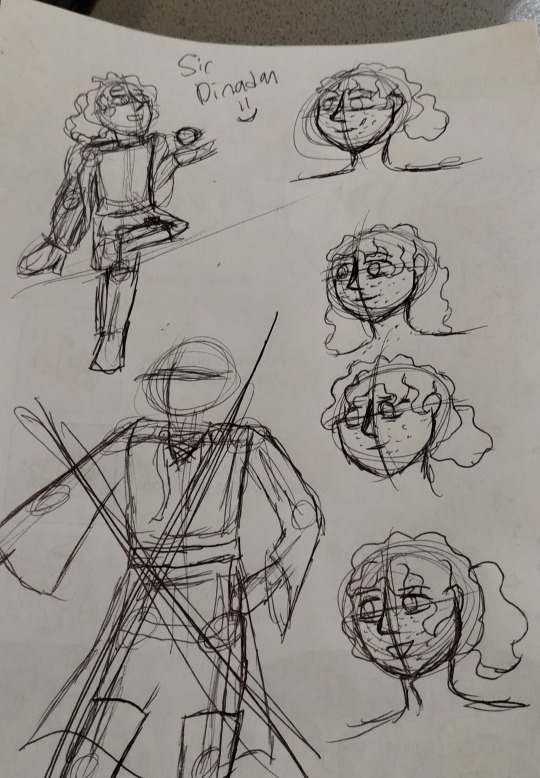
Working on Dinadan lmk if y'all like anything here
8 notes
·
View notes